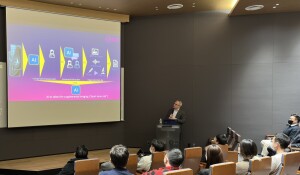por
John R. Fischer, Senior Reporter | December 06, 2022

Lunit Insight presented the results of a study that validating the use of its Lunit Insight MMG AI solution for reading mammograms. (Photo courtesy of Lunit)
Lunit Insight MMG, an AI solution designed by Lunit for detecting suspected breast cancer in mammograms, could potentially replace one of two radiologists tasked with reading and validating the same exams.
Common in Europe and Australia, double reading is meant to reduce false positive diagnoses that lead to unnecessary recalls. But the shortage of radiologists had made implementing this practice more difficult, with those who are part of it now having to spend more time reviewing complex CT and MR scans.
In a new large-scale, population-based, unpublished study discussed at the RSNA Annual Meeting, breast radiologist and lead author Dr. Fredrik Strand, of Karolinska Institutet in Sweden, assessed the accuracy of mammogram interpretations read by two radiologists; Lunit Insight MMG and one radiologist; and each reader separately.



Ad Statistics
Times Displayed: 60606
Times Visited: 1928 Ampronix, a Top Master Distributor for Sony Medical, provides Sales, Service & Exchanges for Sony Surgical Displays, Printers, & More. Rely on Us for Expert Support Tailored to Your Needs. Email info@ampronix.com or Call 949-273-8000 for Premier Pricing.
When combined with a single radiologist, Lunit Insight MMG detected more cancers than two human readers, with a cancer detection rate (CDR) per 1,000 exams of 4.3, compared to 4.1. Alone, it showed non-inferior performance compared to double reading settings, with a CDR of 4.1.
The findings validate the clinical efficacy of AI in actual medical settings for the first time ever in the field of breast cancer research, according to the authors.
"The study shows that one of two radiologists in a double-reading setting can safely be replaced by AI without recalling more women after screening," Strand told HCB News. He adds that filling the role of one with AI also reduces medical costs and results in healthcare reimbursement.
Mammograms were collected over approximately 14 months from 55,579 patient cases of breast cancer screening in actual clinical settings.
In addition to its CDRs, the solution also had a lower recall rate (RR) when used alone or combined with one radiologist. The RR per 1,000 exams was 28 and 15.5, respectively, compared to 29.3 for two radiologists. As a result, Lunit Insight MMG holds potential to decrease time, money and anxiety often associated with recalls, which are many times caused by false-positive mammograms and can potentially do more harm than good.
Strand says replacing all radiologists was not the point of the study and is not realistic at this time.
But because of the radiologist shortage and rise in breast cancer cases, many radiologists are concerned about whether or not the current standard of double reading is sustainable.
"The current climate among breast radiologists around the world is that AI can and should be adopted soon into breast screening programs. In order for AI to be adopted into current workflows, high-quality and independent evidence in the form of a prospective study is required—this is what Lunit's study has achieved," Kihwan Kim, chief medical officer of Lunit's Cancer Screening Group, told HCB News.
Lunit is testing its AI solutions in other prospective studies that are currently underway in multiple countries.
Lunit INSIGHT MMG is FDA cleared and CE marked.

